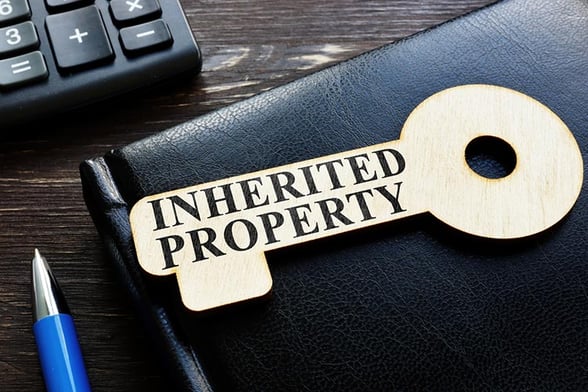
Basis plays an important role in real estate. Typically, it’s the all-in cost of an asset, including sales tax and capital expenses incurred during acquisition such as appraisals, attorney charges, sales commissions, loan and document fees, mortgage insurance premiums, inspections, and other common closing costs.
Basis plays a different role when real property assets are passed on to heirs through inheritance, though. In this article we’ll take a look at how heirs can use a tax provision called a “step-up” in basis to reduce their exposure to capital gains taxes on inherited real estate.
How a Stepped-Up Basis Can Eliminate Capital Gains Taxes
Heirs often inherit real estate upon the death of the property’s owner. Assets could be something as simple as a vacation cabin at the beach or a complex portfolio of commercial office and retail properties.
Some states levy estate and inheritance taxes -- Maryland administers both. You won’t have to pay a federal estate tax unless the total value of your inheritance exceeds $11.7 million in 2021.¹
When you inherit real estate, the Internal Revenue Service doesn’t look at the original cost or basis of the investment but rather steps it up to current fair market value when the asset is inherited. This tax treatment is often called a tax loophole, but it’s perfectly legal and a crucial tool used in estate planning.
Here’s how step-up in basis it works. Say your father purchased a standalone retail building for $1 million, and over time the asset appreciated to $5 million. If the property owner sold the asset before death, he would have a $4 million capital gains tax liability, which is a tax levied on profits generated from the sale of real property assets and securities. Long-term capital gains taxes in 2021 are 0, 15, or 20 percent depending upon annual income and tax filing status, so the tax liability in this scenario could be as high as $800,000 for higher-net-worth individuals.
However, if your father willed the property to you upon his death, then you would receive the asset at a stepped-up basis of $5 million. The step-up in basis tax provision not only eliminates capital gains liabilities but also preserves more of the property owner’s financial legacy. You can divest the asset at that recorded price without incurring any capital gains tax liabilities.
However, if you decide to hold onto that asset for a few more years and it appreciates to $7 million, you’ll be facing a capital gains tax liability if you sell on the $2 million in profits -- unless you complete a 1031 exchange.
What Are 1031 Exchanges and DSTs?
Real estate investors often complete 1031 exchanges to defer capital gains tax liabilities. Essentially, if you replace one investment property for another “like-kind” asset through a 1031 exchange, you won’t have to pay capital gains taxes on any profits generated from the sale of the original asset.
This process allows investors to continually reinvest profits from the sale of real property assets and potentially purchase larger and more expensive assets. You could 1031 exchange your $7 million inherited property for another asset that may appreciate over time to $10 million. Instead of selling, you could 1031 exchange that asset into a larger property of greater value -- assuming market conditions continue to trend upward and there’s no huge real estate crash like we’ve seen in the past.
Alternatively, if you are tired of direct property ownership and are looking for a passive real estate investment, you can purchase shares of a Delaware Statutory Trust for the exact amount needed to satisfy a 1031 exchange. And as noted above, if you bequeath your real estate assets to your heirs, they can receive a step-up in basis that could potentially alleviate any accrued capital gains.
The Bottom Line
A step-up in basis is a re-adjustment of the fair market value of an asset upon the owner’s death when the asset is passed along to his or her heirs. It can be an important tool in estate planning because it can preserve more of your financial legacy to leave for your heirs.
1. Estate Tax, IRS.gov, https://www.irs.gov/businesses/small-businesses-self-employed/estate-tax
This material is for general information and educational purposes only. Information is based on data gathered from what we believe are reliable sources. It is not guaranteed as to accuracy, does not purport to be complete and is not intended to be used as a primary basis for investment decisions. It should also not be construed as advice meeting the particular investment needs of any investor. Realized does not provide tax or legal advice. This material is not a substitute for seeking the advice of a qualified professional for your individual situation. Costs associated with a 1031 transaction may impact investor's returns and may outweigh the tax benefits. An unfavorable tax ruling may cancel deferral of capital gains and result in immediate tax liabilities. All real estate investments have the potential to lose value during the life of the investment. No public market currently exists, and one may never exist, for the interests of any DST program. The purchase of interests in any DST program is speculative and is suitable only for persons who have no need for liquidity in their investment and who can afford to lose their entire investment. Example presented is hypothetical and for illustrative purposes only.



